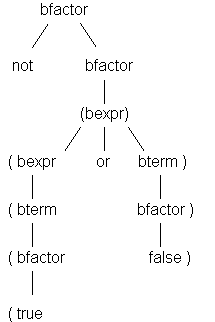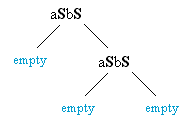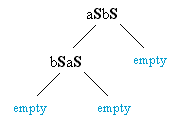
Homework 2:
Individual
Due Date: September 22
Points: 55
| sneech | ::= | '*' | |
| ( '(' <sneech> ')' '*') | | ||
| [ <bander>] <sneech> | ||
| bander | ::= | { '+$+' | '#' } | ('%' <bander> ) |
| 1. | (*) | Not legal. A sneech enclosed in parentheses must have a * outside of the closing parenthesis. |
| 2. | (+$+*) | Not legal. The * must be outside the closing parenthesis. |
| 3. | * | Legal |
| 4. | ***** | Not legal. * is a terminal without a rule allowing repetition |
| 5. | %%%** | Not legal. * is a terminal without a rule allowing repetition |
| 6. | #####** | Not legal. * is a terminal without a rule allowing repetition |
| 7. | (+$+# | Not legal. Must have a closing parenthesis. |
| 8. | +$+#* | Legal |
| 9. | *+$+# | Not legal. There is no provision for a sneech followed by a bander. |
| 10. |
%#*+$+** |
Not legal. * is a terminal without a rule allowing repetition. |
(5 points) Consider the grammar
bexpr ::= bexpr or bterm | bterm
bterm ::= bterm and bfactor | bfactor
bfactor ::= not bfactor | (bexpr) | true | false
Construct a parse tree for the sentence not (true or false).
Show that this grammar generates all Boolean expressions.
| Parse Tree for: not (true or false) |
|
|
bfactor=> bfactor |
bfactor=> bfactor |
|
=> TRUE |
=> FALSE |
|
|
|
|
bfactor r=>bfactor |
bfactor=>bfactor |
|
=> not bfactor |
=> not bfactor |
|
=> not TRUE |
=> not FALSE |
|
nor: |
nand: |
|
bfactor => not bfactor |
bfactor => not bfactor |
|
=> not ( bexpr ) |
=> not ( bexpr ) |
|
=> not ( bexpr or bterm ) |
=> not ( bterm ) |
|
=> not ( bterm or bterm ) |
=> not ( bterm and bfactor ) |
|
=> not ( bfactor or bterm ) |
=> not ( bfactor and bfactor ) |
|
=> not ( true or bterm ) |
=> not ( true and bfactor ) |
|
=> not ( true or bfactor ) |
=> not ( true and false ) |
|
=> not ( true or false ) |
|
|
xor: |
xnor: |
|
bexpr => bexpr or bterm |
bexpr => bexpr or bterm |
|
=> bterm or bterm |
=> bterm or bterm |
|
=> bfactor or bterm |
=> bfactor or bterm |
|
=> ( bexpr ) or bterm |
=> ( bexpr ) or bterm |
|
=> ( bterm ) or bterm |
=> ( bterm and bfactor ) or bterm |
|
=> ( bterm and bfactor ) or bterm |
=> ( bfactor and bfactor ) or bterm |
|
=> ( bfactor and bfactor ) or bterm |
=> ( true and bfactor ) or bterm |
|
=> ( true and bfactor ) or bterm |
=> ( true and false ) or bterm |
|
=> ( true and false ) or bterm |
=> ( true and false ) or bfactor |
|
=> ( true and false ) or bfactor |
=> ( true and false ) or ( bexpr ) |
|
=> ( true and false ) or ( bexpr ) |
=> ( true and false ) or ( bexpr or bterm ) |
|
=> ( true and false ) or ( bexpr or bterm ) |
=> ( true and false ) or ( bterm or bterm ) |
|
=> ( true and false ) or ( bterm or bterm ) |
=> ( true and false ) or ( bfactor or bterm ) |
|
=> ( true and false ) or ( bfactor or bfactor ) |
=> ( true and false ) or ( false or bterm ) |
|
=> ( true and false ) or ( false and bfactor ) |
=> ( true and false ) or ( false or bfactor ) |
|
=> ( true and false ) or ( false and true ) |
=> ( true and false ) or ( false or true ) |
|
|
|
NOT is implemented by bfactor
OR is implemented by bterm
AND is implemented by bexpr
(10 points) Consider the grammar:
S ::= aSbS | bSaS | empty
Show that this grammar is ambiguous by constructing two different leftmost derivations for the sentence abab.
| S | ::= | aSbS | S | ::= | aSbS |
| => | a empty bS | => | a bSaS bS | ||
| => | a empty b aSbS | => | a b empty aS bS | ||
| => | a empty b a empty bS | => | a b empty a empty bS | ||
| => | a empty b a empty b empty | => | a b empty a empty b empty | ||
|
= |
abab |
= |
abab |
Construct the corresponding rightmost derivations for abab.
|
S |
::= | aSbS |
S |
::= | aSbS |
| => | aSb aSbS | => | aSb empty | ||
| => | aSb aSb empty | => | a bSaS b empty | ||
| => | aSb a empty b empty | => | a bSa empty b empty | ||
| => | a empty b a empty b empty | => | a b empty a empty b empty | ||
| = | abab | = | abab |
Construct the corresponding parse trees for abab.


| JavaScript |
<if_then>::= if (<Boolean_expression>) { {<command.something>( statement )} } [else { {<command.something>( statement )} }] |
| Pascal |
<if_then>::= if <Boolean_expression> then begin { < Pascal statements > } end else begin { < Pascal statements > } end |
| Prolog | <if_then> := if ( (<ConditionGoal>, !), <ThenGoal>, <ElseGoal>) |
| Lisp |
<test> ::= '('<Boolean_expression>')' <action> ::= '('<statement>')' <test set> ::= '('<test> <action>')' | <test set><test set> <if_then> ::= '(cond' <test set>');' |
| COBOL |
<if_then> ::= IF <Boolean_expression> THEN {<statement commands>} ELSE {<statement commands>} END-IF |
| Simula | <if_then> ::= if <condition> then begin [ <statements> ] end; else begin [ <statements> ] end; |